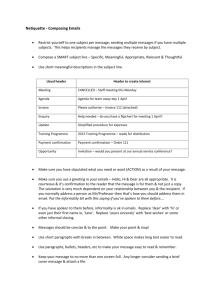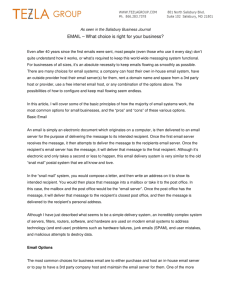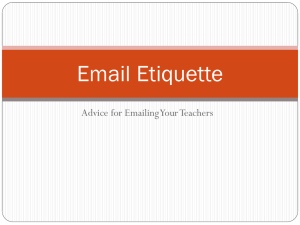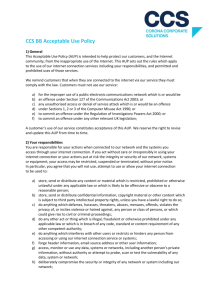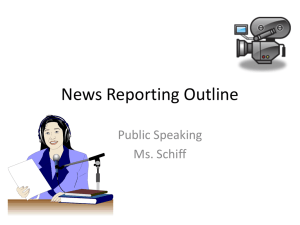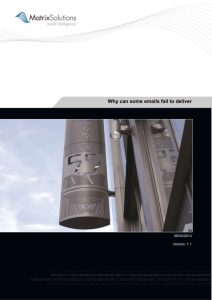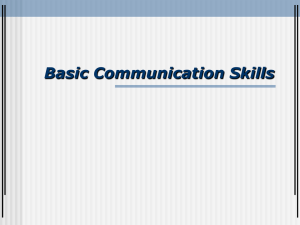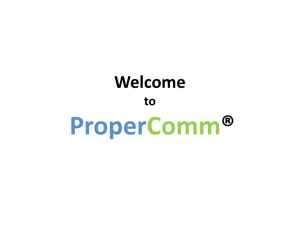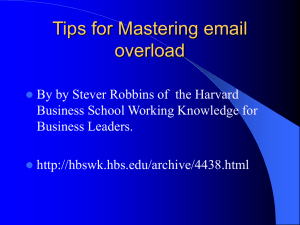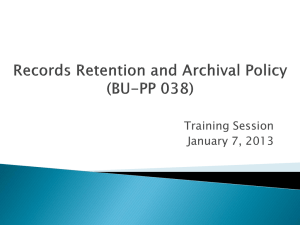M7L3-PPT-Sending
advertisement
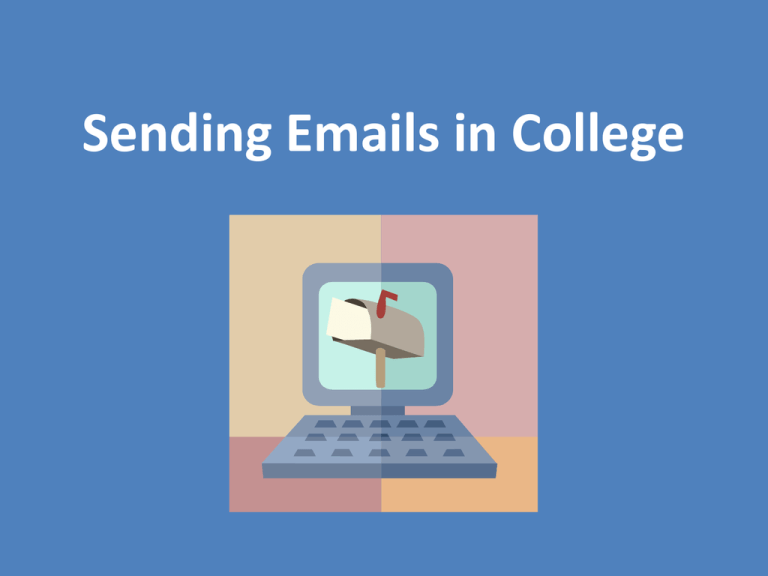
Sending Emails in College Why Are Email Skills Important? • Primary method of communication between students and university faculty/staff • Conveys two types of information – What did you say? – How did you say it? content style, tone, vocabulary, manners, spelling/grammar, clarity, etc. • Creates an impression of the sender – Communication skills, abilities as a student – Professionalism, maturity, investment in education College Email Etiquette Guidelines Do Don’t Fill in the subject line Leave the subject line blank Make the subject line specific, but brief Make the subject too general or too long Use keywords that may trigger a junk-mail or spam filter Select an easy-to-read, standard font Select a fancy, decorative font Begin with a polite & respectful salutation Begin the content of the email without including a salutation Dear Professor Jones, Hello Dr. Powers, Address the recipient by title & last name Dr. Waters Mrs. Elkin Professor Tyler Look up the recipient’s title if needed Use an overly casual salutation Hey, Yo! Hi Tom, Do Don’t Write in standard English Write in complete sentences Write emails in the same format as text messages or social networking posts Use professional vocabulary Write in fragments, phrases, or lists Use slang or informal language Use standard, commonly-accepted abbreviations where appropriate e.g. a.k.a. UNC PSYC 101-003 MWF/TR Capitalize words properly I’m Joe Smith from Greenville, NC Use correct punctuation Thank you! I look forward to hearing from you. Use informal abbreviations or shorthand common to text-messaging gr8 2day LOL OMG TTYL Write in all capital or lowercase letters YOUR CLASS IS AWESOME i’m from greenville nc Overdose on exclamation points Thank you!!!!! Can’t wait to hear from you!!!! Do Don’t Be clear and concise in communicating your message, questions, or concerns Expect the recipient to recognize you by name alone Include both the course and section number every time you email a professor Make the recipient guess what you want or need Put the email in context by stating who you are, how the recipient knows you, and why you’re emailing him/her Ramble or include unnecessary details Get straight to the point Maintain a professional tone Use an overly-familiar or personal tone Use respectful language Use disrespectful, emotionally-laden, or overdramatic language Use “I statements” and take responsibility as appropriate if there’s a conflict or problem that you need resolved I’m concerned I may have misunderstood Remember that there will be a permanent written record of your words once you click send this sucks panicking freaking out fault/blame really frustrated Include anything in your email that you would be embarrassed to have shared with others or that you may regret after clicking send Do Spell-check and grammar-check Proofread before sending Have someone else proofread particularly important emails Sign emails with both your first and last name Don’t Send emails that have significant spelling and grammar errors that will distract from the content of the message Rely solely on spell-check and grammarcheck to catch errors Expect the recipient to know who you are based solely on your email address Use an email “signature” that automatically inserts your full name and contact information at the bottom of every email you send Indicate if a message is urgent, timesensitive or needs a reply Expect an instantaneous reply “Email-bomb” by sending multiple emails over a short period of time to elicit a faster response Additional Email Etiquette Tips • Check your email frequently and reply promptly • Pay attention to “Reply” versus “Reply All” • Once an email dialogue is underway, some aspects may become less formal – Use the “reply” feature instead of starting a new email so you don’t have to repeat all the background information each time – Depending on your relationship with the recipient, more informal salutations, less context, or slightly more casual language may be appropriate – However, some aspects – especially tone, spelling/grammar, respectful language, etc. – should remain formal College Email Template Salutation Dear Dr. / Mr. / Mrs. / Ms. / Professor [Last Name] Greeting Hello. / Good morning. / Good afternoon. Introduction/Context This is [your full name] from your [day and time] [subject, course and section #] class. I’m contacting you because [brief explanation of reason for email]. Problem/Concern/Question [Describe what you need. Be thorough, but get straight to the point. Include any specific questions you have or specific outcomes you want.] Ending/Thanks Thank you for your help. Sign Off Sincerely, [your full name] Sample Email Based on This Template Dear Dr. Stevenson, Good morning. This is William Banks from your PHYS 1200-007 class that meets MWF at 9:00 am. I’m emailing you to request additional help with this course. I’m having difficulty understanding the theory of relativity that we discussed in class. So far, I have read over my notes, reread the textbook, and asked a friend in the class for help. Would you be willing to meet with me to help me understand it better? I’m available during your office hours on Wednesday at 11 if that would work for you. If not, is there a more convenient time when I could visit your office? Thank you very much for your help. Sincerely, William Banks Another Email Template Review These Emails • Look at the emails on the next two slides • Assess each email based on the following questions: – – – – – Is the email effective and clear? Does it convey what the student most likely wants to convey? Does it convey anything the student may not want to convey? How could it be improved? How do you think the email would impact the recipient’s impression of the sender? Cameron’s Email Jane’s Email Compare These Emails to Our Guidelines Did the email… Appropriately identify the purpose of the email in the subject line? Begin with a polite and respectful salutation? Use standard English, complete sentences, and professional vocabulary? Use only commonly-accepted and necessary/helpful abbreviations? Use proper capitalization and punctuation? Clearly communicate the message, questions, or concerns, including necessary context or background information? Clearly convey a respectful and professional tone? Contain no spelling or grammatical errors? Include both first and last name of the sender? Yes No Sample College Email Scenario As a class, draft an appropriate email to send in the following situation. Remember to use the guidelines discussed in the lesson. You are registering for spring semester classes. Last week you met with your academic advisor to discuss the courses you will need to take in the spring and also spent time developing your preferred schedule. One of the classes you had planned to take is now full, and you are not sure if you should ask for special permission to be added to that class or if you should just select something else. If you need to select another course, you are not sure which one to select. Compose an email to your advisor to ask for guidance with this decision. Sample College Email Scenario As a class, draft an appropriate email to send in the following situation. Remember to use the guidelines discussed in the lesson. Your next assignment in your English Composition class is a research paper. You do not feel completely comfortable using the university’s library and would like some assistance with finding sources for your paper. Compose an email to the reference librarian to set up an appointment. Be sure to let the librarian know the topic you have selected so that s/he can be prepared for the meeting. This work is licensed under a Creative Commons Attribution-NonCommercial 3.0 Unported License.
